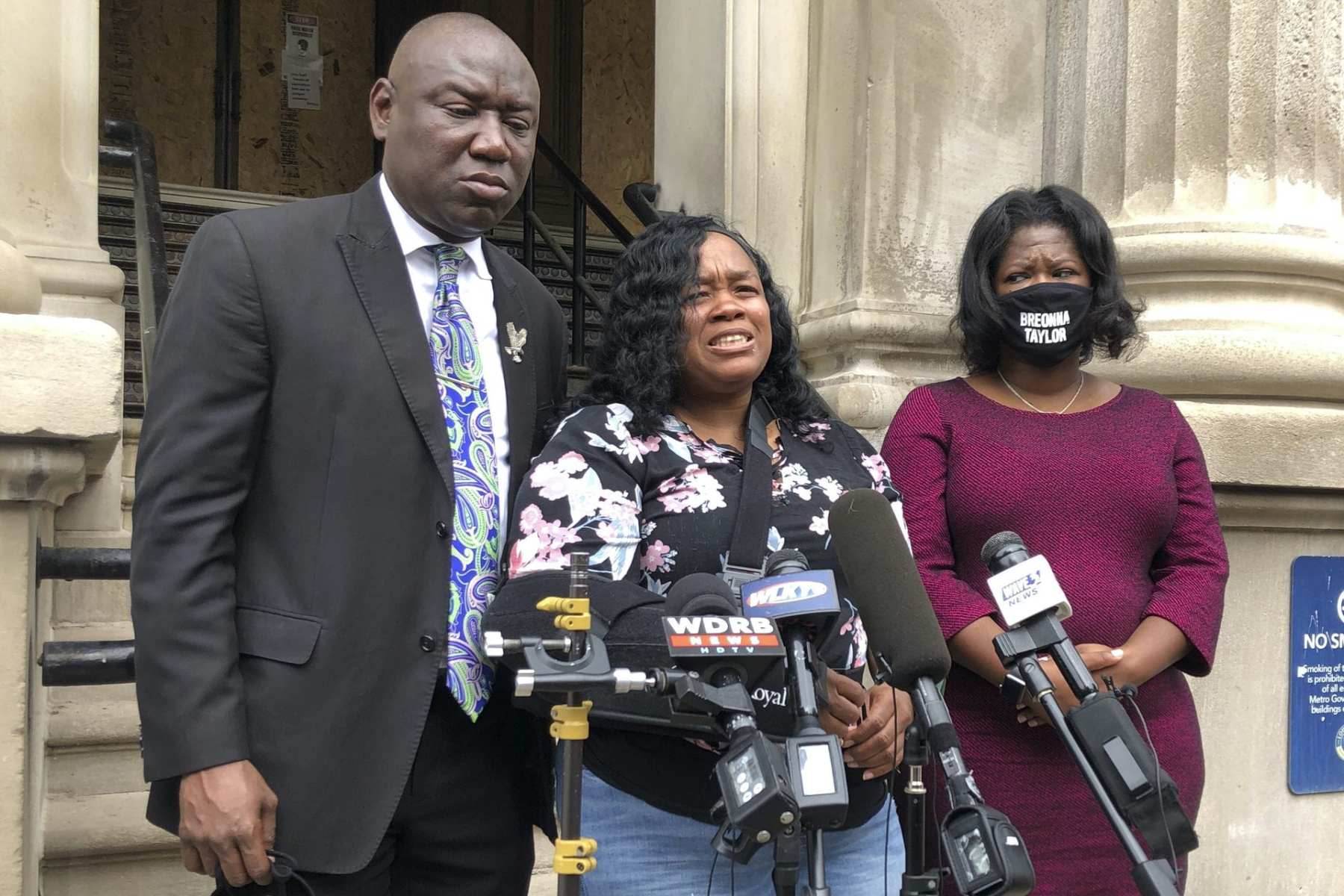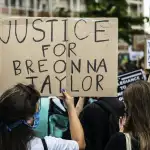Following the death of 26-year-old Breonna Taylor, who was shot by police in her home in March, the city of Louisville agreed to pay her family $12 million and implement police reforms. The three officers involved in the no-knock warrant served in the middle of the night have not been charged in her death, and only one has been fired, which has sparked months of protests.
The Courier-Journal first reported the settlement of the wrongful-death lawsuit this morning.
The settlement marks the end to the civil lawsuit, but attorneys and advocates are continuing to pressure Republican Kentucky Attorney General David Cameron, the first Black person in his role, to bring charges against the three officers involved in Taylor’s death.
In a press conference Tuesday afternoon at Louisville Metro Hall, Taylor’s mother, Tamika Palmer, said this day marked only the beginning of getting full justice for her daughter.
“We must not lose focus on what the real job is,” Palmer said. “That being said, it’s time to move forward with the criminal charges because she deserves that and much more. Her beautiful spirit and personality is working through all of us on the ground, so please continue to say her name, Breonna Taylor.”
The small, socially-distanced audience echoed Taylor’s name immediately.
Democratic Mayor Greg Fischer apologized for Taylor’s death, a “tragedy” that happened 186 days ago, and outlined the police reforms that accompany this settlement. Louisville Metro Police Department now has a housing credit program to incentivize officers to live in certain low-income census tracts inside the city. It also encourages officers to volunteer two paid hours every two-week pay period during the regular work shift at a community organization.
Before Tuesday’s announcement, when officers applied for warrants, commanding officers did not always sign off on them. Now, officers will need approval from someone the rank of sergeant or above, Assistant Police Chief Robert Schroeder confirmed. And in order to alleviate officers having to respond to mental health emergencies, LMPD will employ social workers to assist on some calls.
These reforms come after Louisville’s city council unanimously passed Breonna’s Law in June, eliminating no-knock warrants and requiring body cameras for search warrants.
The legal team representing Taylor’s family removed their black masks bearing Breonna Taylor’s name before making remarks. Lonita Baker, an attorney based in Louisville, said the financial settlement was “nonnegotiable” without police reform, but still wants the three officers involved in Taylor’s death to be held accountable.
“This is unheard of in one of these cases, where you get a financial settlement and police reform,” she said. “We are not going to stop our calls to hold the officers responsible for Breonna’s death accountable. We’re going to continue to put pressure on the attorney general’s office to present a fair case to the grand jury. We know that that indictment is coming from the grand jury — we have faith that that indictment is coming from the grand jury.”
Baker also “looks forward” to the results of the ongoing FBI investigation into Taylor’s death, and vowed to work on behalf of and with protesters who have put their lives on the line for justice for Taylor and systemic issues in Louisville.
In black latex gloves, attorney Ben Crump took the podium and talked about his hopes for this settlement setting a precedent. He said that vice presidential candidate Kamala Harris was the first national elected official to uplift Taylor’s case following his efforts to get the ear of anyone who would listen to him talk about what happened to Taylor.
“It’s been so long getting to this day, where we could assure that Breonna Taylor’s life wouldn’t be swept under the rug like so many other Black women in America who have been killed by police, marginalized,” he said. “I am grateful to the actions of the city of Louisville today.”
Police obtained the warrant to connect Taylor to her ex-boyfriend Jamarcus Glover, who had a history of drug charges. On the same night of the raid at Taylor’s apartment, Glover was arrested in a separate police effort 10 miles away, where police recovered drugs. Glover’s attorney said his client was offered a plea deal that hinged on naming Taylor, who was working as an EMT in Louisville, as a co-defendant to his “organized crime syndicate.”
As The 19th previously reported, two months before the video of George Floyd’s death during an arrest sparked national protests, Taylor was shot by police at least eight times. Both Floyd and Taylor’s names have since become rallying cries, but the delayed response to Taylor’s death highlighted the dearth of coverage when police kill Black women. This inequity in coverage has come under scrutiny before; the #SayHerName campaign started in 2014 to bring attention to this very issue.
In the past five years, police have shot and killed 250 women, 89 of them killed at their homes or in residences where they sometimes stayed, according to data from the Washington Post. Although Black women make up 1 percent of all police shootings tracked by the Post’s Pulitzer-winning project, they make up 20 percent of women shot and killed by police. They represent 28 percent of unarmed deaths of women at the hands of police despite only constituting 13 percent of the female population.
Taylor’s settlement is just the latest iteration of varied outcomes when police shoot and kill Black women and girls.
A no-knock warrant led police to the home of Mertilla Jones in 2010. Her 7-year-old granddaughter Aiyana Stanley-Jones was there with her, and an officer fatally shot Stanley-Jones in the head after throwing a flash-bang grenade into the Detroit home. Two trials in her death led to hung juries. The family settled the case for $8.25 million in April 2019.
Atatiana Jefferson, 28, was shot and killed in her Fort Worth, Texas, home in October 2019. She was playing video games with her nephew when a neighbor called a non-emergency number because her front door had been ajar for hours. Police arrived, parked their vehicles out of sight, and walked around the house without alerting Jefferson. When she looked out of her bedroom window, Aaron Dean, a police officer who has since resigned, fired a single fatal shot at her.
Dean’s murder trial began in March.
Korryn Gaines, 23, was shot and killed while making a peanut butter and jelly sandwich for her 5-year-old son, Kodi, at her home in Baltimore in August 2016. When police let themselves into her apartment to serve a warrant stemming from a traffic violation, they encountered Gaines holding a shotgun and retreated. A standoff ensued. When Gaines headed to the kitchen, Cpl. Royce Ruby, who had been watching Gaines for five hours through her cracked apartment door, fired from the hallway, entered the apartment and shot Gaines three more times. Gaines fired once.
Kodi was struck by the first bullet, which bounced off the fridge and grazed his cheek. Family lawyers say Gaines had a mental illness that caused her to “possibly detach from reality,” the Baltimore Sun reported.
“Her children were her everything,” her mother, Rhonda Dormeus, said in an interview with the African American Policy Forum.
A jury composed entirely of women awarded Gaines’ family a $38 million settlement in February 2018, which Baltimore County Circuit Court Judge Mickey J. Norman rescinded, citing qualified immunity protections for the officer who shot Gaines. This July, a Maryland appeals court reversed that ruling, granting the settlement to the Gaines estate and her children and parents.
Kayla Moore, a 41-year-old transgender woman, died of suffocation in 2013 after six officers restrained her when responding to a 911 call from Moore’s roommate, who was concerned about her mental health. Moore dealt with schizophrenia, and her sister Maria said officers misgendered her while she struggled to breathe. In January, a California appeals court ruled that Berkeley police did not use excessive force against Moore.






